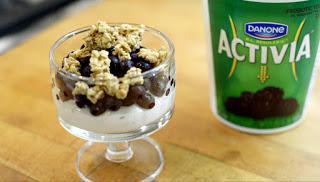I'm excited to be working with Activia to bring you some information on keeping your healthy resolutions. Next week I'll be sharing some tips from one of my favorite TV personalities, Melissa Grelo from THE SOCIAL. Today, cookbook author and professional home economist Mairlyn Smith (you may recognize her as a Cityline guest expert) weighs in with her advice. Turn healthy intentions into long-term success When it comes to New Year’s resolutions, Canadians are a classic case of good intentions gone awry.
According to a recent survey by Leger and Activia, three-quarters of Canadian women typically make resolutions related to their health, including doing more physical activity (88 per cent) and eating a healthier diet (87 per cent).
The bad news? 73% of women who make resolutions will keep them for less than a year, abandoning for reasons including a lack of motivation and lifestyle fit.
The good news? For every challenge, there is a solution, and mid-January is the perfect time to get on track. According to cookbook author and professional home economist Mairlyn Smith, the secret to keeping resolutions starts with taking small steps towards success.

“Any resolution needs to be realistic and achievable, which means that it needs to fit into your lifestyle,” says Smith. “Think of a resolution as a personal goal, and remember that healthy changes aren’t about deprivation. In order to succeed at any goal in the long term, you need to truly enjoy the process and appreciate the impact it has on your wellbeing.”
Smith suggests the following solutions to overcome the most common barriers to maintaining resolutions:
The barrier: More than half (54 per cent) of women say they lack the motivation necessary.
The solution: Set measurable goals. For example, instead of simply planning to become more physically active, aim to walk 30 to 45 minutes three times a week. Another option for fitness first-timers is to set a goal to walk a minimum number of steps each day.
The barrier: Three in 10 (31 per cent) women set goals that are too ambitious.
The solution: Make smaller changes – especially when it comes to introducing new physical activity or dietary habits. This includes gradually introducing healthy food into a daily routine. For example, Smith suggests an activity like the Activia Challenge, taking place from January 11 to 21, which encourages participants to increase their daily intake of probiotics by simply eating yogurt twice a day for two weeks.

“Stick to these smaller goals for a whole month, and by the end, those behaviours will have become new habits,” says Smith.
For more information visit Activia.ca/Challenge
Stay tuned next week when Melissa Grelo shares her healthy tips for 2016!
Disclosure: This post was generously sponsored by Activia. Opinions are, as always, my own.


